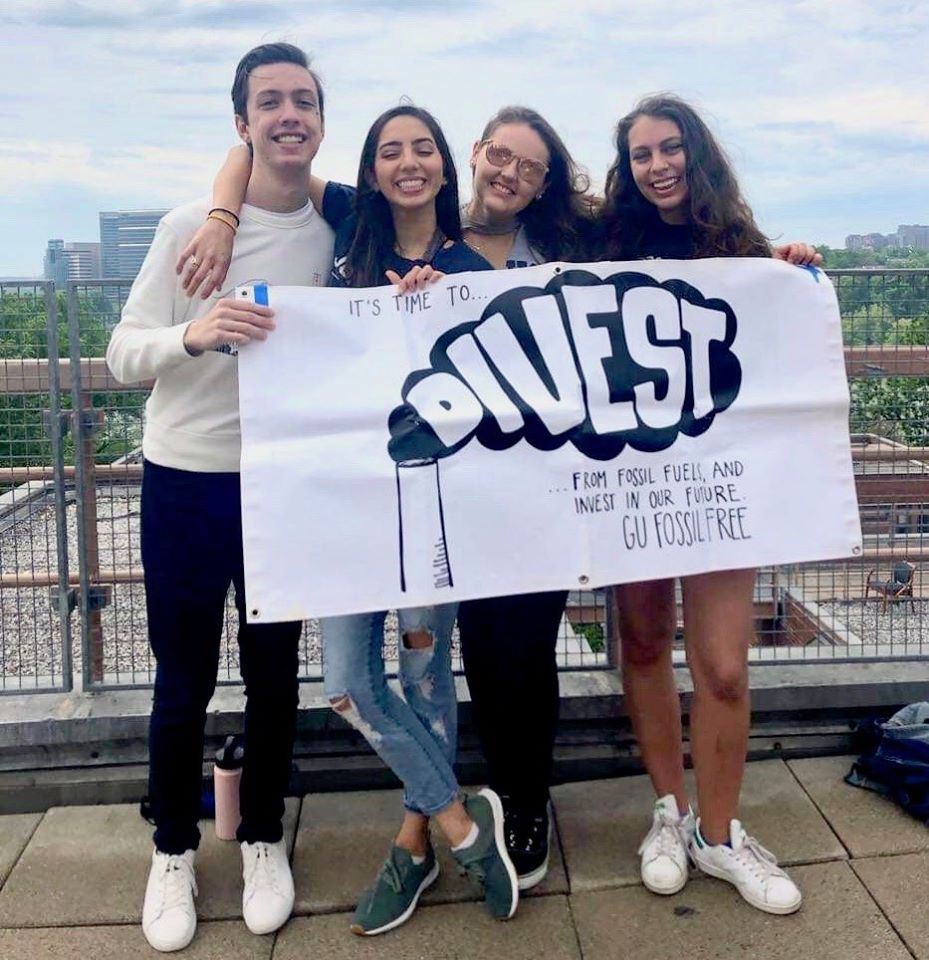Students will vote on whether or not to support Georgetown University’s divestment from fossil fuel companies by 2024 in a Feb. 6 referendum after the Georgetown University Student Association Senate approved the initiative Jan. 20.
GU Fossil Free, a student group that advocates for the university to adopt socially responsible investment policies, began making plans for a referendum in the beginning of the fall 2019 semester. The bill proposing the referendum passed with 19 GUSA senators voting in favor, four voting against and one abstaining, surpassing the senate’s two-thirds voting majority required to put forward referenda.
The referendum will be attached to the Feb. 6 GUSA Executive election. If students approve the referendum by a wide margin, the vote could be the final push for the university to take action on divesting from fossil fuel companies after GUFF’s years of campaigning, according to Victoria Boatwright (COL ’22), a member of GUFF who introduced the referendum proposal before the senate.

“This referendum is really just to show the board of directors that this is a priority for students,” Boatwright said at the Jan. 20 senate meeting.
The referendum is the latest phase of years of advocacy by GUFF, which has worked since 2012 to encourage the university’s board of directors to fully divest from fossil fuels. Through previous GUFF initiatives, the university divested from coal in 2015 and from tar sands in 2018.
In January 2019, GUFF submitted another proposal to the Committee on Investments and Social Responsibility, which is made up of students, administrators and faculty, advocating for full divestment. GUFF met with CISR in March 2019 to discuss the proposal and answer questions, according to GUFF member Celia Buckman (SFS ’21).
After the meeting, GUFF submitted a memo to CISR that elaborated on potential steps for divestment from fossil fuels over a five-year timeline. At the start of this semester, GUFF had not heard back from CISR about the proposal or the memo, despite repeated requests for follow-up meetings, according to Buckman.
Since the university had not responded to the student group, GUFF began making plans for a referendum at the beginning of the fall semester to apply additional pressure on the university, Buckman wrote.
“GUFF followed the proper protocol for proposing a change to the endowment, and we feel the administration did not hold up their end of the bargain,” Buckman wrote in an email to The Hoya. “When an administrative body simply refuses to meet with students making a good faith effort to engage them, we will only amplify our message across campus until they do.”
Over the past semester, CISR has conducted further research to develop a response to the fossil fuel divestment proposal submitted by GUFF, according to a university spokesperson. The university expects to receive CISR’s recommendation in the coming days, the university spokesperson wrote in an email to The Hoya.
The university reached out to GUFF on Tuesday after the senate vote asking to meet, according to Sadie Morris (SFS ’22), a member of GUFF who also introduced the proposal at the senate meeting. At the meeting, CISR will provide an update regarding GUFF’s proposal.
“We were really grateful to hear from them after fairly limited responses by email last semester and no meetings with us,” Morris wrote. “We are pleased that university admin are taking our campaign seriously and look forward to a productive meeting.”
The referendum proposes immediately freezing all new direct investments in fossil fuel companies. The referendum also outlines a set of standards, coined Clean Energy Standards by GUFF, by which the university should judge companies in its investment portfolio. These standards include renouncing disinformation on climate science, supporting government policies that reduce carbon emissions and publicly announcing support for the Paris Agreement on climate change.
If a company does not currently meet the Clean Energy Standards, the referendum calls for the university to form a working group of students, faculty and administrators to urge the company to align with the standards. By 2024, either Georgetown will have divested from all fossil fuel companies or the companies will have adopted the Clean Energy Standards, according to the terms of the referendum.
The Clean Energy Standards are a strict set of guidelines meant to push for divestment from these companies, according to Morris.
“Essentially any fossil fuel company would not meet the clean energy standards so divestment would be achieved from all fossil fuel companies,” Morris wrote in a statement to The Hoya. “Companies that are in the process of switching to non-fossil fuel industries could keep investment.”
For a referendum to appear on a GUSA presidential ballot, it must either obtain 300 signatures from the student body and approval from GUSA’s Election Commission or be introduced through a current senator, according to GUSA bylaws. Last week, Senator Leo John Arnett (SFS ’22) agreed to bring the referendum forward, he said.
“Honestly, I had heard about GUFF for a really long time and I’ve heard about divestment, but I didn’t really know what kind of steps were being taken,” Arnett said. “Most importantly, it’s something that I support, but I think it was really pretty awesome that they reached out.”
The university remains committed to stewardship for the planet, the university spokesperson wrote.
“Georgetown plays a leading role in addressing critical sustainability challenges through its academic mission and prudent management of its physical and financial resources,” the university spokesperson wrote. “As a global research university guided by our Catholic and Jesuit heritage, we are committed to engaging the complex issues of sustainability to advance the common good for current and future generations.”
Hoya Staff Writer Jaime Moore-Carrillo contributed reporting.




















